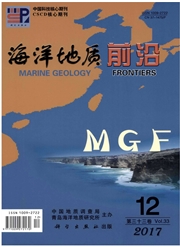

 中文摘要:
中文摘要:
南黄海盆地是在前震旦系克拉通基础上发育的中、古生界海相与中、新生界陆相多旋回叠合盆地。通过地震资料解释,结合邻区钻井与区域地质资料,对南黄海盆地中部隆起中、古生代地层及其形成演化进行了研究,结果表明,南黄海盆地中部隆起沉积了较全的中、古生界海相地层,发育第四系—新近系、中—下三叠统青龙组、上二叠统、下二叠统—上泥盆统、中—下志留统,奥陶系—震旦系和前震旦系变质岩系等7套地震地质层序;主要经历了前震旦纪基底形成、震旦纪—早古生代克拉通发育、晚古生代—中三叠世稳定台地—陆内裂陷、晚三叠世—古近纪形成与抬升剥蚀及新近纪-第四纪坳陷沉降5个阶段。
 英文摘要:
英文摘要:
The South Yellow Sea Basin is a multi-cycle superimposed basin consisting of the marine Mesozoic-Paleozoic basin overlaid by the continental Mesozoic-Cenozoic basin on the basis of the Presinian cratonie basement. Based on the seismic data, combined with drilling wells in its adjacent areas as well as regional geological data, the Mesozoic-Paleozoic stratigraphy and the formation and evolution of the Central Uplift of the South Yellow Sea Basin were studied. Results show that there developed rather complete Mesozoic and Paleozoic marine strata on the central uplift of the South Yellow Sea Basin, including seven seismic sequences of the Quaternary-Neogene, the Middle-Lower Triassic Qinglong Formation, the Upper Permian, the Lower Permian-Upper Devonian, the Middle-Lower Silurian, the Ordovician-Sinian and the Pre-Sinian metamorphic series. The tectonic evolution of the Central Uplift of the South Yellow Sea Basin can be divided into the following stages: the basement formation stage in Precambrian, the craton developmental stage in Sinian-Early Paleozoic, the stable platform and continental rifting stage in late Paleozoic-Middle Triassic, the formation and uplifting and erosion stage in Late Triassic-Paleogene and the depression stage in Neogene and Quaternary.Key words: tectonic evolution; multi-cycle superimposed basin; the Mesozoic-Paleozoic; seismic sequence; the Central Uplift of the South Yellow Sea Basin
 同期刊论文项目
同期刊论文项目
 同项目期刊论文
同项目期刊论文
 期刊信息
期刊信息
